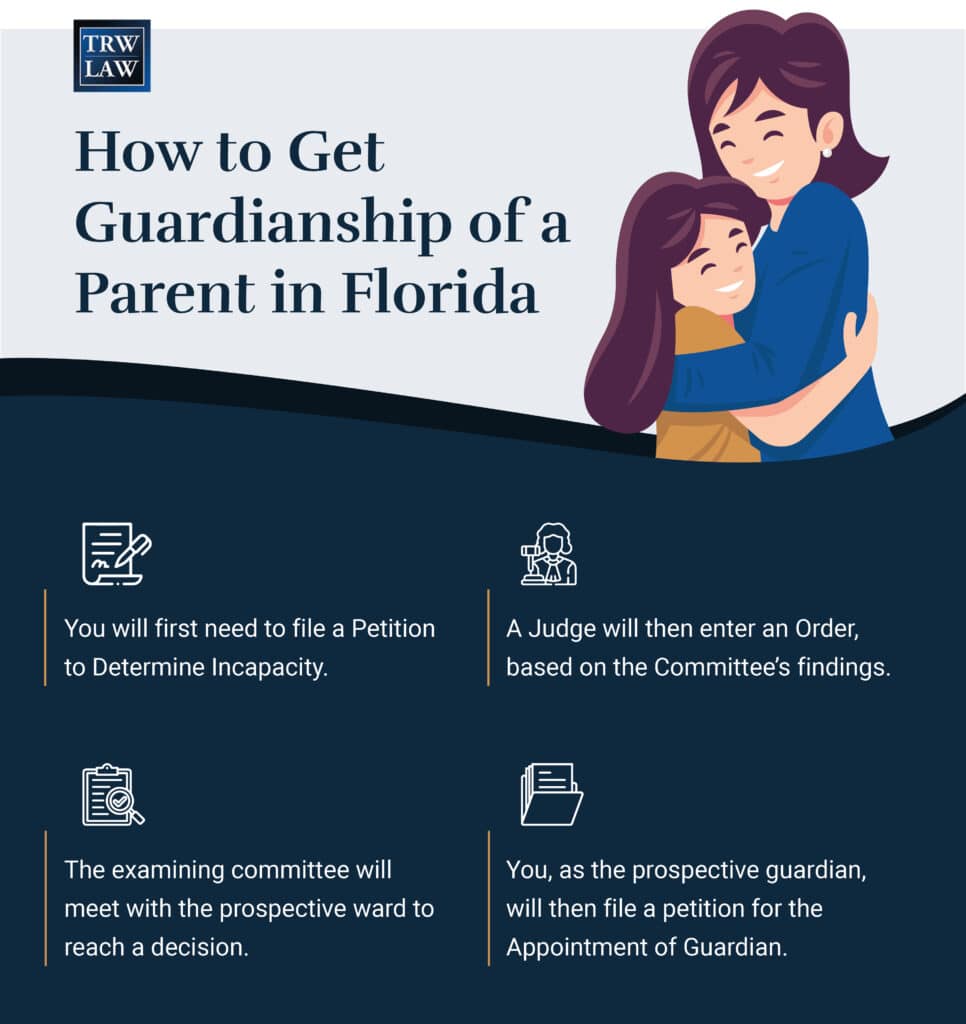Becoming a Guardian in Florida
To get guardianship of a parent in Florida, the simplest method is to have them sign a power of attorney designating you as their guardian. By signing a power of attorney, your parent consents to the guardianship. This process does not require going to court; it can save time and money compared to filing a petition with the local court. However, if your parent is already incapacitated or unable to sign the power of attorney, you will need to file a petition with the local court and hire an attorney to help you with the process. However, in many cases, it might not be possible for the parent to sign a power of attorney because they might be mentally incapacitated, for instance.
Florida law offers recourse when a parent cannot sign a power of attorney appointing you as the guardian. You can petition the Court to be appointed as the legal guardian of your parent. However, under Florida law, you must meet certain criteria prerequisites for your petition to be successful. You, as the prospective guardian, must:
- Be at least 18 years old
- Submit to a full credit background check
- Submit to a full criminal background check
- Attend a Guardianship educational course
Generally speaking, you must also be a resident of Florida, but the law offers a path to guardianship even if you are not a Florida resident.
How Do You Become a Guardian?
Now that we have a background on guardianship law, what practical steps do you need to take in order to be appointed as a guardian?
- You will first need to file a Petition to Determine Incapacity. As the name suggests, this is a petition to establish your parent’s incapacity. Whether your parent is actually incapacitated will be determined by an examining committee, consisting of a medical doctor.
- The examining committee will meet with the prospective ward to reach a decision. The committee will determine whether a guardianship is required, and to what extent. The committee will draft a report on its findings and deliver it to the Court.
- A Judge will then enter an Order, based on the Committee’s findings. This Order will be a ruling on whether the prospective ward is incapacitated and lay out the extent of the incapacity.
- You, as the prospective guardian, will then file a petition for the Appointment of Guardian. The Court will then decide whether to approve the Petition, and appoint you as the guardian, or someone else.

Is Parental Guardianship Right for You?
If you are concerned about your parent’s mental capacity, and their ability to make decisions, then a guardianship might be the best option. Under a guardianship you will be appointed as a legal guardian over your parent and will be authorized to make decisions on his/her behalf. In this guardianship relationship, the individual whom you take responsibility for as a guardian, is referred to as a “ward.”
The beginning of a guardianship means the start of a new journey for you as the guardian. As a guardian you now have a fiduciary duty to your parent/ward. You must also act in your ward’s best interests, be fully committed to the guardianship, and act in good faith always.
Be aware that there are varying degrees of guardianships available at your disposal. Full guardianship authorizes the guardian to make any, and all, decisions on behalf of the ward, whether they be financial or medical. Limited guardianship defines the scope of guardian’s authority, for instance, to making financial decisions only. Parental guardianships can also be temporary, permanent, and even shared by more than one person.
Contact an experienced Florida Probate Litigation Attorney
If this sounds like a lot to handle, there is no need to worry. The Stuart, Florida guardianship attorneys at The Law Offices of Travis Walker are among Martin and Palm Beach Counties’ most trusted when setting up a guardianship for their parents. With over 125 years of combined experience, our team is proud to serve clients all over the Treasure Coast.













